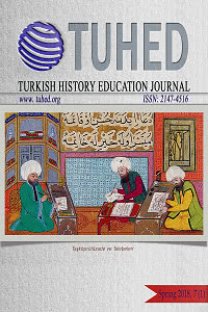EĞİTİMDE CİNSİYET EŞİTSİZLİĞİNE TARİHTEN BİR ÖRNEK: ANTİK YUNAN
Eğitim tarihi, Antik Yunan, Kız Çocuklarının Eğitimi, Cinsiyet Eşitsizliği, eğitim
A HISTORICAL EXAMPLE of GENDER INEQUALITY in EDUCATION: ANCIENT GREEK
___
- Bonnard, A. (2004). Antik Yunan Uygarlığı. İstanbul. Burnet, J. (2008). Aristoteles- Eğitim Üzerine. İstanbul.
- Antik Kaynaklar Aristophanes. Nephelai. Kullanılan Metin ve Çeviri: Bulutlar. Çev.: A. S. Delilbaşı. İstanbul. 1994. Euripides. Andromache. Trsl.: S. Stewart, W. D. Smith. New York. 2001.
- Christesen P. (2012). “Athletics and Social Order in Sparta in the Classical Period”. Classical Antiquity 31/2 (2012) 193-255.
- Chrystal, P. (2017). Women in Ancient Greece. London.
- Modern Eserler
- Cole, S.G. (1981). “Could Greel Women Read and Write?” H.P. Foley (ed.)., Reflections of Women in Antiquity. New York: Gordon and Breac Science: 219-45.
- Davidson, T. 2008. Greklerde Eğitim Düşüncesi. Say. İstanbul.
- Dürüşken, Ç. (1990). “Quintilianus'ta Çocuk ve Yetişkin Eğitimi, ve Günümüzle Bağlantıları” İSTANBUL ÜNİVERSİTESİ Sosyal Bilimler Enstitüsü Eskiçağ Dilleri ve Kültürleri / Latin Dili ve Edebiyatı Temmuz, 1987.(Basılmamış Doktora Tezi) . Freeman, C. (1996). Mısır, Yunan ve Roma- Antik Akdeniz Uygarlıkları. İstanbul.
- Hobhouse, W. (1910). The Theory and Practice of Ancient Education. New York.
- Hodkinson S. & Powell C. A. (1999). Sparta: New Perspectives. London 1999.
- Platon. Devlet (Politeia). Çev. S. Eyüboğlu; M.A. Cimgöz. İş Bankası Kültür Yayınları: İstanbul. 2012.Platon. Lysis. çev. N.P. Boyacı. Kabalcı. İstanbul. 2006. Platon. Nomoi. Kullanılan Metin ve Çeviri: Yasalar. trans. by. T. Saunders Harmondsworth. 1970.
- Joyal, M.; Mcdougall, I., Yardley, J. C. (2009). Greek and Roman Education: A Sourcebook. New York: Routledge.
- Laemmer,M. (1981). “Women and Sport in Ancient Greeece”, ed. E. Joki. Medicine and Sport. 14, s. 16-23. MacLachlan, B. ( 2012). Women in Ancient Greece: A Sourcebook. Londra.
- Deighton, H.J. (2005). A Day in the Life of Ancient Athens. Bristol Classical.
- Marrou H. I. (1956). A History of Education in Antiquity.
- Nobili C. (2014). “Performances of Girls at the Spartan Festival of the Hyakinthia”. Eds. S. Moraw & A. Kieburg. Maedchen im Altertum/Girls in Antiquity (2014) 135-148.
- Patterson, C. B. (2013). “Education in Plato’s Laws”. The Oxford Handbook of Childhood and Education in the Classical World. Oxford University. Oxford. 365-381.
- Phillips, M. G. &Roper, A. P. (2006). History of physical education. in The Handbook of Physical Education. ed. by. D. Kirkç, D. Macdonald and M: O’Sullivan. London. Plant, I. M. 2004. Women Writers of Ancient Greece and Rome. London. Pomeroy, S. B. (1977). “Techniki kai Mousikai: The Education of Women in the Fourth Century and in the Hellenistic Period”. AJAH 2: 51-68. Pomeroy, S. B. (1994). Xenophon Oeconomicus: A Social and Historical Commentary. Oxford. Pomeroy, S. B. (2004) Spartan Women. Oxford.
- Roisman J. & Yardley J. C. (2011). Ancient Greece from Homer to Alexander. Malden.
- Ste. Croix G.E.M. (2016). Antik Yunan Dünyasında Sınıf Mücadelesi. İstanbul. Whitby M. (2012). Sparta. New York.
- Winkler J. J. (1990). The Constraints of Desire. London.
- Papapostolou M. & Konstantinakos P., Mountakis C. & Georgiadis K. (2010). “Rites of Passage and Their Role in the Socialization of the Spartan Youth”. Sport Management International Journal 6/1 (2010) 43-52.
- Çevrimiçi: https://katespitzmiller.com/
- Yıldırım, A & Şimşek, H. (2006). Sosyal Bilimlerde Nitel Araştırma Yöntemleri. Seçkin. Ankara.
- Euripides. Hippolytus. Trsl.: D. Kovacs. Cambridge. Harvard University Press. 2010.
- Herodotos. Historiai. Trsl.: A.D. Godley. London. 1961. Ksenophon. Lakedaimonion Politeia. Kullanılan Metin ve Çeviri: “Spartalıların Anayasası”. Trans.: B. Umar, Dokuz Eylül Üniversitesi Hukuk Fakültesi Dergisi 1 (1980) 277-96.
- Bilgiç E. (2014). “Epigrafik Veriler Işığında Antikçağ Anadolusu’nda Eğitim”. Cedrus II. 323-338.
- Ksenophon. Oeconomicus. Kullanılan Metin ve Çeviri: Oeconomicus. Trans.: E. C. Marchant. Cambridge. 1953.
- P. Oxy. IV. 744: (Çevrimiçi: http://www.papyri.info/apis/toronto.apis.17/)
- Pausanias. Periegesis Tes Hellados. Trsl.: W.H.S. Jones. Londra 1964. (Loeb Classical Library).
- Platon. Protagoras. Kullanılan Metin ve Çeviri: Protagoras. Çev.: N. Ş. Kösemihal. İstanbul. 1997.
- Plutarkhos. Bioi Paralelloi, Perikles. Ankara. 1945. Pseudo-Plato. Axiochus. çev. Jackson P. Hershbell, Scholars Press, 1981.
- Terentius. Heautontimorumenos. 626-30: (Çevrimiçi: http://www.perseus.tufts.edu/hopper/text?doc=Perseus%3Atext%3A1999.02.0115%3Aact%3D1%3Ascene%3D1)
- Dillon, M. P. J. (2013). “Engendering the Scroll: Girls’ and Women Literacy in Classical Greece”. The Oxford Handbook of Childhood and Education in the Classical World. Oxford University. Oxford. 396-418. Ducat, J. (2006). Spartan Education : Youth and Society in the Classical Period. Bristol.
- Themistius. Orations. The Private Orations of Themistius. trans. R. J. Penella. 2000.
- Theokritos. Epithalamios Helenes. Kullanılan Metin ve Çeviri: Yunan Çoban Şiirleri. Trans.: S. Sinanoğlu. İstanbul. 1976.
- Bloomer W. M. (2013). “The Ancient Child in School”. The Oxford Handbook of Childhood and Education in the Classical World. Oxford University Press. Oxford.
- Blundell, S. (1995). Women in Ancient Greece. Harvard University Press. Cambridge.
- ISSN: 2147-4516
- Yayın Aralığı: 2
- Başlangıç: 2012
- Yayıncı: Ahmet Şimşek
EĞİTİMDE CİNSİYET EŞİTSİZLİĞİNE TARİHTEN BİR ÖRNEK: ANTİK YUNAN
Evren ŞAR İŞBİLEN, Derya ÇIĞIR DİKYOL
TARİH PROGRAMLARI HAKKINDA Çamlıca Lisesi Tarihi Muallimi Ali Ekrem (İNAL)
Çeviri: TÜRKLERDEN TERCÜME ETMEK
Yayın Kritiği: GEÇMİŞİ SUSTURMAK; TARİHİN ÜRETİLMESİ VE İKTİDAR
SANAL MÜZELERİN TARİH DERSLERİNDE KULLANIMININ ÖĞRENCİ GÖRÜŞLERİNE GÖRE DEĞERLENDİRİLMESİ
Çeviri: TARİH PROGRAMLARI HAKKINDA
Çeviri: TARİHSEL DÜŞÜNME KRİTERLERİ: KANADA ÖLÇME-DEĞERLENDİRME SİSTEMİ İÇİN BİR ÇERÇEVE
